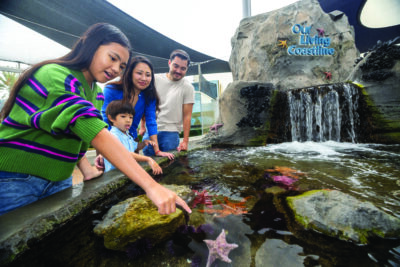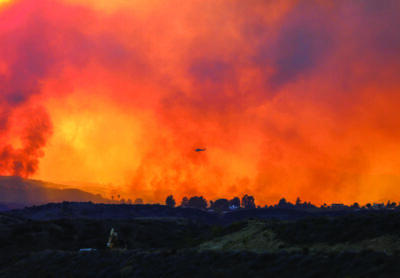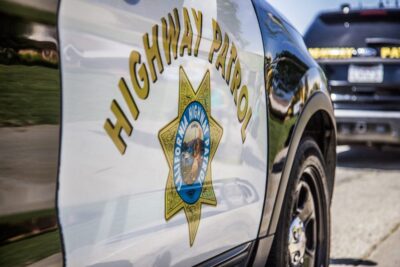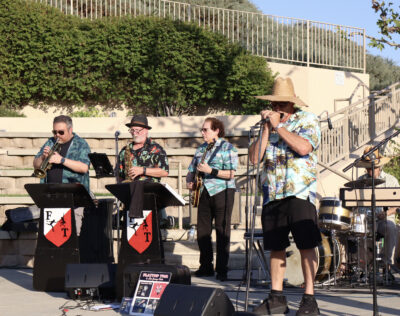With Castaic and Val Verde residents hopeful for possible relief at a court hearing soon, the lawyers for Chiquita Canyon Landfill and L.A. County asked questions of the men and women who gave statements regarding the county’s request for a preliminary injunction this week.
Independent of the county’s lawsuit, lawmakers Wednesday also discussed legislation aimed at the landfill’s problems in a hearing of the Senate’s Environmental Quality Committee, one of several efforts from local lawmakers.
Judge Maame Ewusi-Mensah Frimpong scheduled a hearing Thursday in L.A. County’s latest bid to make Chiquita Canyon responsible for its mess.
The injunction sought by the county is seen by many residents as their best hope for relief after the landfill closed down on Dec. 31, and then about two months later, the landfill stopped offering help to those affected by its smells.
There have also been several legislative efforts, but the preliminary injunction could compel the landfill to restart its relocation assistance, which was helping residents overwhelmed by the landfill’s odors.
The court case
L.A. County sued in December and is now seeking $4,000 a month for relocation funds for almost 950 households that have played a role in about 30,000 complaints Chiquita has received in the past two years. The total comes to more than $22 million.
“My Castaic and Val Verde constituents have been living with the persistent and disruptive odors stemming from the Chiquita Canyon Landfill,” L.A. County 5th District Supervisor Kathryn Barger wrote in a statement Tuesday, issued via email from Helen Chavez, her communications director. “No one should have to endure these kinds of conditions in their own homes, and I understand how deeply this has affected daily life, health and peace of mind for so many families.”
On Monday and Tuesday, 10 people who submitted sworn statements about Chiquita Canyon were subject to questioning from both sides in the court case. Nine spoke in favor of the county’s request, including: Thanne Berg, deputy director of California’s Department of Toxic Substances Control; Muntu Davis, the county’s public health officer; and Steven Howse, the lead plaintiff.
One testified for Chiquita Canyon: Steve Cassulo, the facility’s general manager.
The landfill has been plaguing residents with its overwhelming smells and leachate problems for nearly two years.
Chiquita Canyon has repeatedly stated that it’s working “hand-in-glove” with local, state and federal regulators to address the issues at the landfill. It has declined to comment on active litigation.
In February, despite reports from the landfill’s regulators and residents that the subsurface reaction and its problems were actually worsening, the landfill claimed the problems were getting better and ended its relief program — which prompted L.A. County to sue for the injunction that’s being discussed Thursday.
“On Monday, residents testified in federal court in support of the county’s motion for injunctive relief,” Oshea Orchid, a partner with Sethi Orchid Miner, one of the firm’s representing residents in lawsuits against the landfill, and Howse’s lawyer, wrote in a text message. “Steve Howse testified that while landfill gases have been a problem for years, in recent years they had become more severe, with residents having immediate health impacts from exposure. Other residents also testified that the impacts on their families were significant in the last few years, highlighting the need for immediate relief.”
In the Legislature
In Sacramento on Wednesday, Assemblywoman Pilar Schiavo, D-Chatsworth, presented Assembly Bill 28, which creates specific rules for CalRecycle to enforce that are aimed at preventing another Chiquita Canyon situation.
“Chiquita should really never happen in any other community, and that’s what this bill is really trying to do, to make sure that we prevent this kind of a disaster from happening in any other community in the state,” Schiavo told the Senate’s Environmental Quality Committee.
The bill sets several benchmarks for methane emissions related to when landfill temperatures begin rising to levels of concern, which begin at 131 degrees in the legislation and escalate, with specific actions tied to the emissions and temperatures. There are also additional monitoring requirements.
Jane Williams, executive director of California Communities Against Toxins, testified the now nearly 100-acre incident could have been prevented had more aggressive measures been taken.
Reports from landfill officials have indicated the subsurface “elevated temperature event” has been burning waste and leachate underground at temperatures above 240 degrees for more than two years, in a reaction area that state regulators have said is spreading. Chiquita Canyon has denied these claims.
Sen. Suzette Martinez Valladares, R-Acton, thanked Schiavo and the resident who shared her story with the committee. The bill ultimately passed by a 7-0 vote and now heads to the Senate Appropriations Committee.
“It’s a shame that it’s been three years,” said Valladares, who is a member of the committee. “I have friends and family who live in Castaic in this area, that are impacted by this, and we are all doing our best to try and address the Chiquita Canyon issue but also stop this from happening in the future.”
Valladares asked about the temperature benchmarks and where those come from, looking at the “science behind the bill.”
Schiavo said the temperature benchmarks were codifying federal Environmental Protection Agency statutes into state law. Williams talked about the unprecedented nature of the problem in the landfill, adding that she wasn’t discussing Chiquita’s unique problems to disparage the industry.
Normally methane emissions-systems landfills are much more effective, she said.
“Most of the landfills in the country are not on fire. Most of them do not have a temperature signature from space. Most of them are being managed,” she said. “They’re a landfill. And so here, that management system failed, and then the regulatory agencies failed to see these rising temperatures and aggressively attack it and say, ‘Hey, you can’t be doing this.’”
Williams said the sheer volume of complaints against Chiquita, approximately 30,000, is unprecedented.
Valladares also said this week that her conversations with Attorney General Rob Bonta’s office regarding the state joining the county’s Chiquita Canyon Landfill lawsuit have been productive.
Valladares also introduced Senate Bill 816, which is similar to a bill Schiavo presented in the Assembly, and would make it so any Chiquita Canyon benefits would not be subject to income tax on relief payments. That bill is currently in the Assembly’s Revenue and Tax Committee.
Congress
Rep. George Whitesides, D-Acton, confirmed last week at the Chiquita Canyon Landfill Advisory Committee that his first federal bill, meant to provide tax relief for residents impacted by the landfill, did not pass the House.
Similar to the state bills and one initially created by Whitesides’ predecessor, former Rep. Mike Garcia, the bill prevents past and future landfill-relief payments from being federally taxed.
“As it stands now, these payments are considered taxable income,” Whitesides said, “which means the families could lose access to crucial income-based programs like Medicare and MediCal,” in addition to Social Security benefits.
“As Congress considered its first budget package, I introduced the Chiquita Canyon Tax Relief Act as an amendment to that bill. My position was simple: If Congress is gonna pass a budget that cuts essential programs and gives tax breaks to the very wealthy, the least it could do is offer basic relief to working families harmed by this landfill disaster.”
He said both times he proposed it as an amendment it was rejected.
“But we’re going to keep fighting,” he told the committee, adding that he was hoping he gets the bill into an appropriations bill. “There would be further opportunity this fall.”
Whitesides also told the committee he was asking for federal help on two fronts. He had asked the EPA in March to expedite its landfill investigation, and he’s asking if there’s any possibility the Federal Emergency Management Agency, or FEMA, can help residents.








